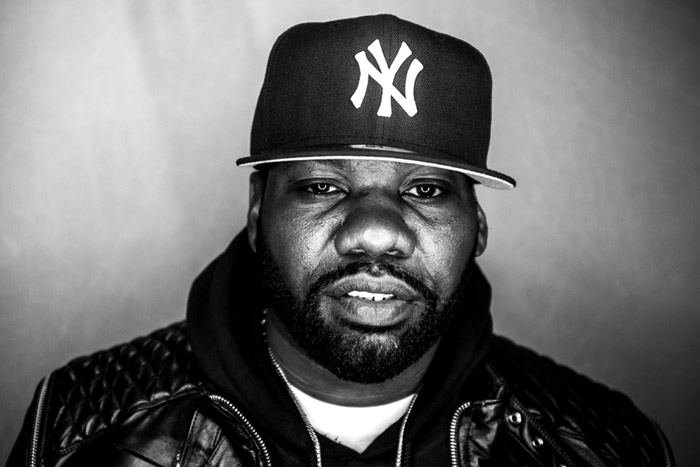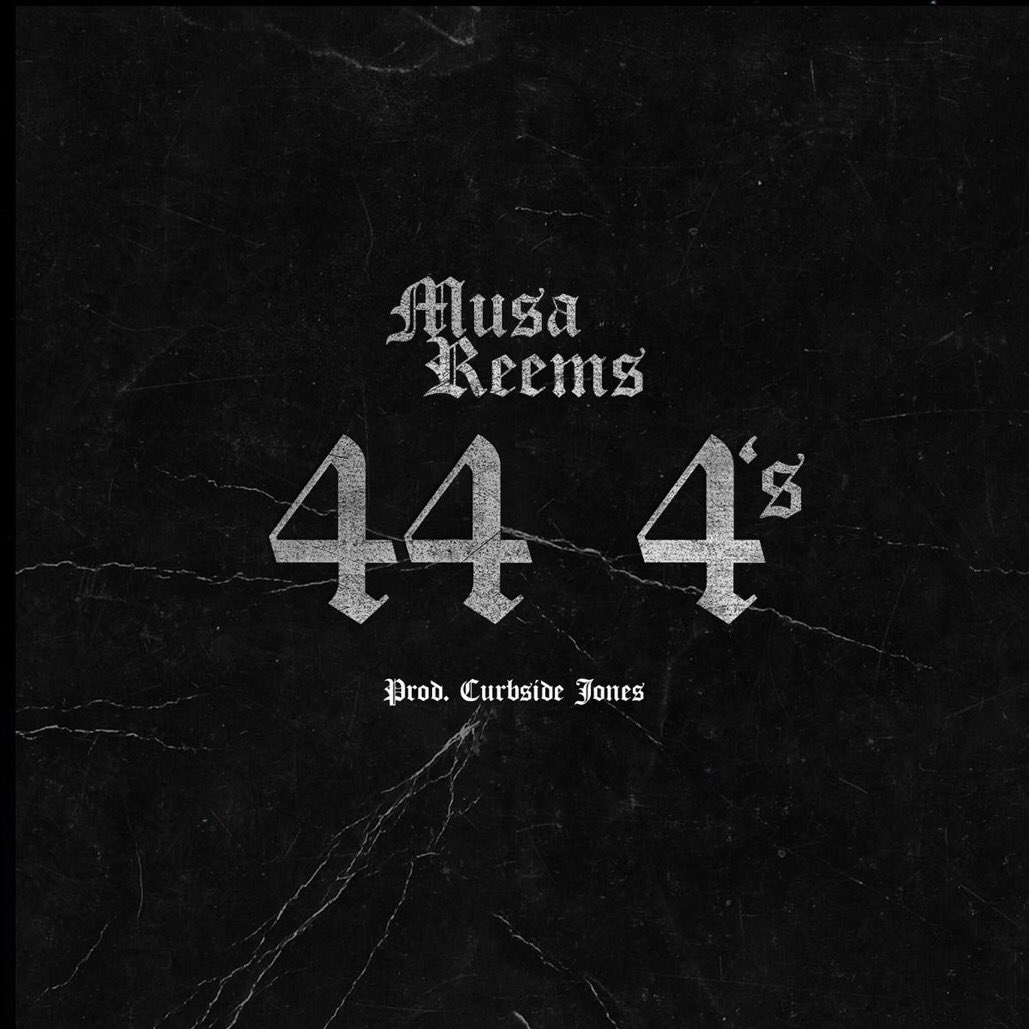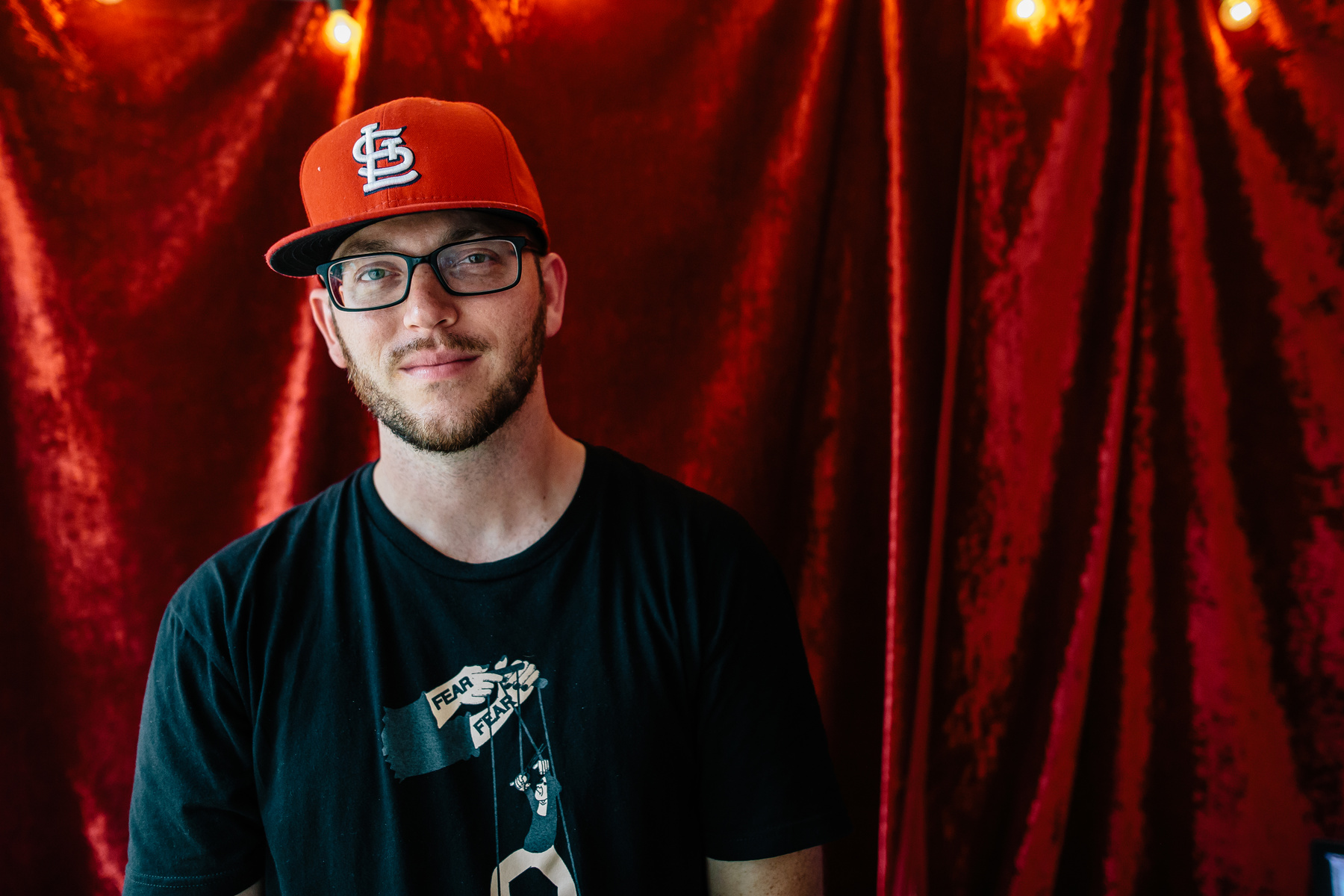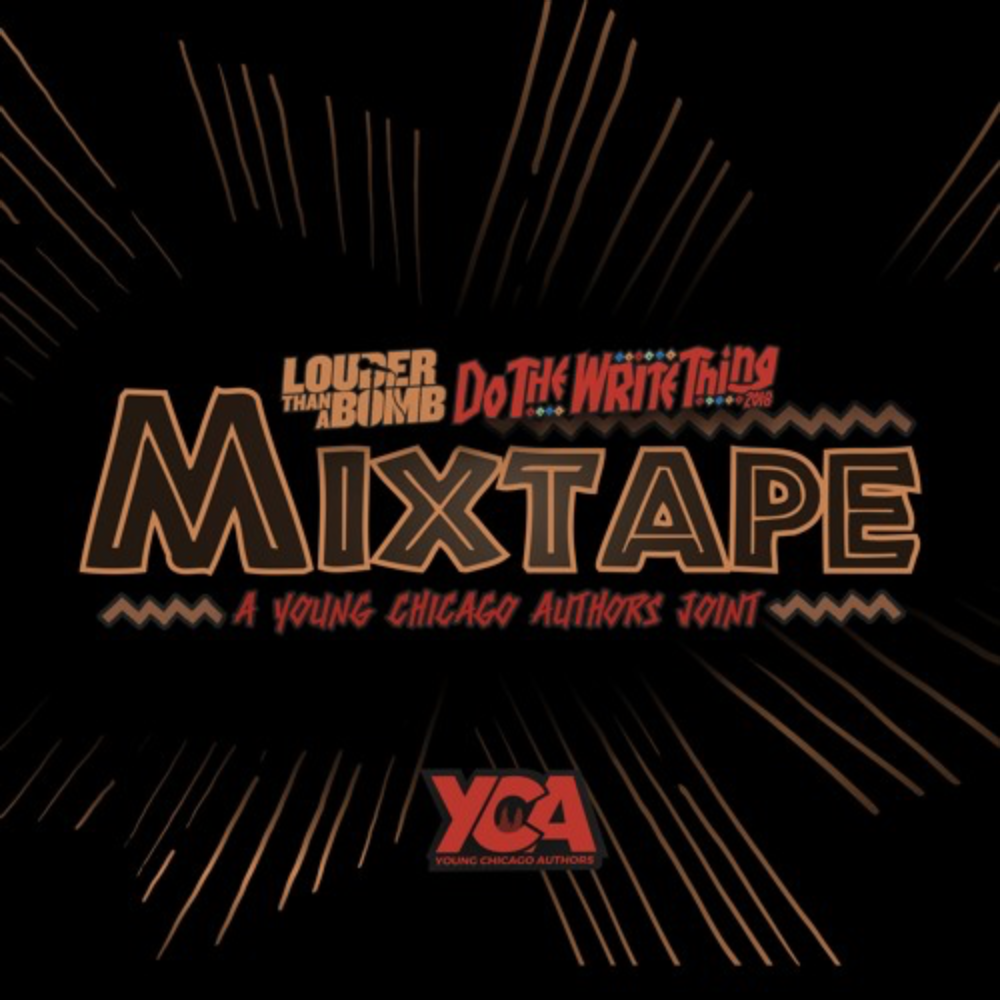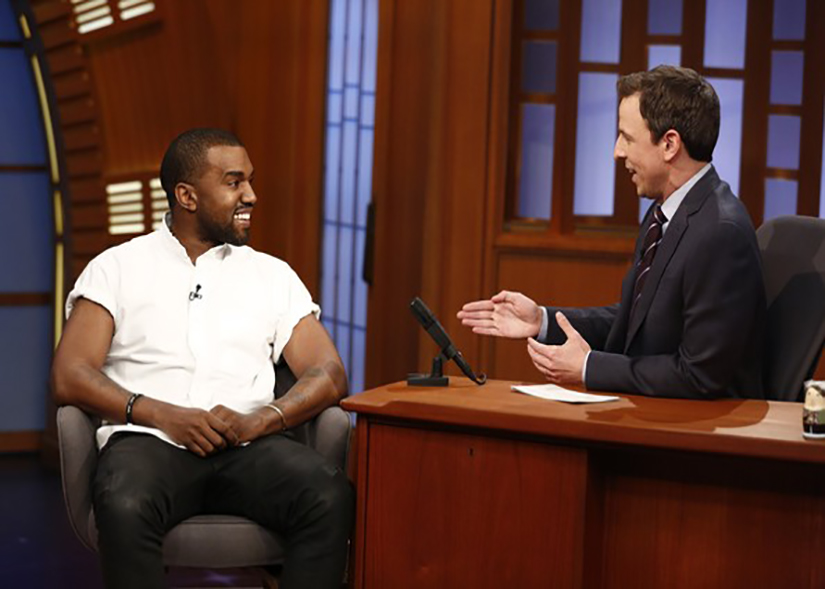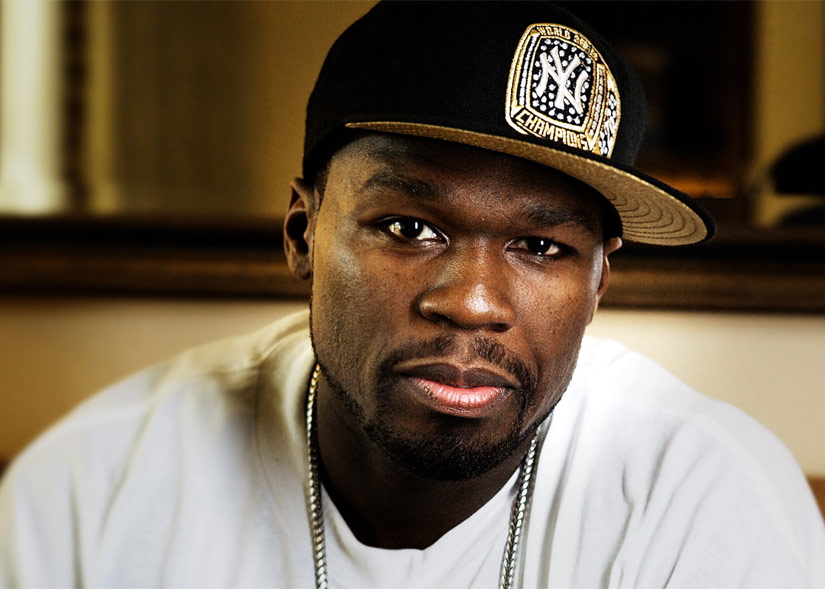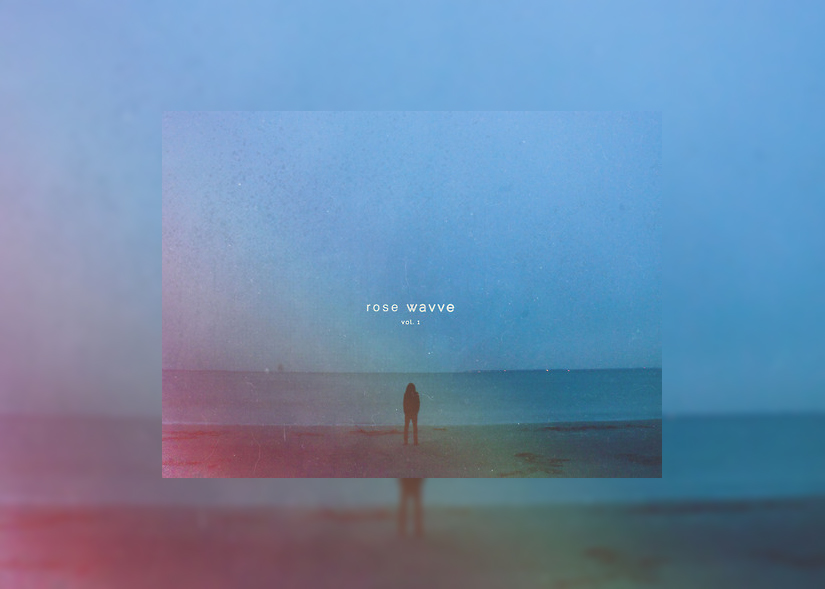[RH Interview] Raekwon on the meaning of Wu-Tang, getting out of Staten Island, and his motivation to be a great emcee.
"Exactly, way before Disney," Raekwon says about his early days venturing into Manhattan and hitting Union Square to catch burgeoning Hip Hop shows and parties featuring the likes of Rakim, Big Daddy Kane, LL Cool J and others. There's a laugh from the crowd, and Raekwon himself chuckles a little bit realizing the stark contrast between the grimy Times Square of the 80's vs the tourist haven now home to the naked cowboy, a large M&M's store, and yes, a plethora of Disney characters.
Raekwon is one of the founding members of the Wu-Tang Clan and a certified Hip Hop luminary. The immense achievements of the group and their beloved status within Hip Hop and music culture is not something that he takes for granted or holds haphazardly. "I’m always going to protect that flag," he tells the crowd, gathered at Chicago's Soho House for an intimate conversation with the Chef. "That flag is what got me here today. I probably wouldn't ever came to Chicago if it wasn’t for that flag. I probably wouldn't be able to take care of my mom today if it wasn't for that flag. I wouldn’t have kids probably, and they wouldn’t be able to go to great schools if it wasn't for that flag. So of course I'm going to hold that flag with dignity and integrity every time."
Decked out in a clean pair of Jordan's and matching Jordan brand shorts and fleece, Rae is dressed for the occasion, "I'm on my Chicago shit," he shouts emphatically to kick things off. This talk, one that took place on May 18th, has been years in the making, possibly since Rae rapped almost fortuitously, "catch me up in Soho, it's a no-no," on our CS classic "Keep It Politics", recorded during a weekend in the fall of 2010. It was roughly a year earlier when I first met the Chef at rubyhornet's original office and he dubbed me a "Baby Howard Cosell". I still have the Cuban Linx II posters that he signed for me using the same nickname proudly framed in my office, just above the desk where I am writing right now.
Over the course of an hour, we traced his path from Staten Island to legendary status, including how he found the RZA and used music a way to stay out of trouble, to making his mother proud through his success in the Clan. "The first thing I was thinking was that I could go back home and tell my mom I got a job. That was more important to me than anything. Just to go back and tell her, 'look your son ain't no knucklehead,' you know what I mean. 'Your son got something going on.'
Indeed, The Chef still has things going on. In 2017 he released his most recent studio LP, The Wild and has been touring regularly ever since. It brings me back to something he told me way back during that wild weekend in 2010, "As long as I know that I can keep it pushing, and keep my pen where it need to be, I'ma stop when I want to stop." Those words still hold true today, and if anything was clear from our talk at Soho House, it's that The Chef still has the passion and hunger to be a great emcee and he ain't stopping anytime soon.
Read our full interview below.
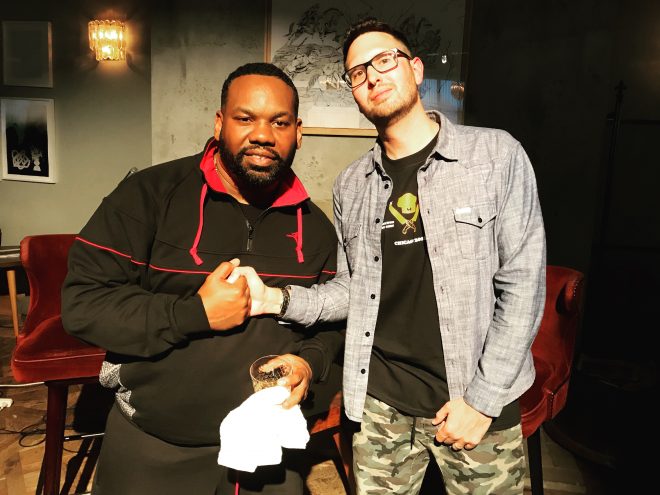
rubyhornet: What’s up man?
Raekwon: Peace!! I’m on my Chicago shit. What’s good!!
rubyhornet: You got the Jordans on?
Raekwon: Yeah of course.
rubyhornet: Whenever I go to New York and I step off the plane, the air hits me and it smells a certain way, driving into the city, I start seeing the buildings and I get an energy. And I always wondered, as someone not from Chicago, do you get an energy when you land here? Is there a Chicago energy?
Raekwon: Of course! Of course it’s in the air. You feel it in the air that you’re in Chicago you know? And I'm just being honest, it’s like… this is definitely one of my top cities. So I love coming out here.
rubyhornet: I want to start at the beginning with you. When you started to discover Hip Hop, where you were in you life? Was this around the time you formed the Baby Crash Crew?
Raekwon: I didn’t form the crew. I was just apart of it and it was really some neighborhood shit, you know? It was like hanging out with friends that you grew up with. And we came up with that name, BCC. BCC stands for, like you said, Baby Crash Crew. We was running around getting into shit, getting into trouble, but it more started from going to school together. We all went to school together, our jurisdictions was in the same area you know? Our district rather.
rubyhornet: So at what point did you discover Hip Hop and rap music? Was it the Sugarhill Gang? What was kind of that first thing? Because I heard you talk about Hip Hop acting as almost a magnet. You were just magnetized towards this music and culture. What was it that was grabbing you?
Raekwon: You know, just the neighborhood, watching the older brothers do they thing. They was like our big brothers and father figures and they would do a lot of hanging out. They would break out, they would be going to like block parties in other neighborhoods and that became a thing. Just to see what the older dudes was doing and then emulate what they were doing. So we know that they going to a party, we wanted to go too. You know, so that’s when Hip Hop was really, I'd say for me, say around 82’ or 83 I was a kid, and just growing up in the neighborhood and watching the older dudes. Everything they did, from what they wore, to where they was going, to what they ate. My generation of cats that was living in the neighborhood, we was just wanting to follow the procedure and do the same shit. And I remember at that time, we used to go and hang out on 42nd street up in Manhattan. And that was the place to be, that was the shit for us. Like you get on the ferry, you go across, jump on the train, take that up to 42nd street. And you see the bright lights and all that, and the movie theater; $5 a movie. And you see all kinds of crazy shit, crazy people you know. Triple X theaters and shit you know all that type of stuff.
rubyhornet: Time Square before Disney.
Raekwon: Yea exactly. Way before Disney.
rubyhornet: I got you. Def Jam was a big inspiration for what we do at Closed Sessions. And I only got to experience that through old music videos and going back through releases, but you grew up around the time that I only read about, those classic Tunnel parties were happening, Danceteria etc with artists like Run-DMC, Beastie Boys, LL Cool J etc. Where you going to those parties? Where you at those concerts?
Raekwon: You know what, there was a place that we used to go to called Union Square. And Union Square was like a nightclub, but it was like ill space, there was nothing fly about it. It’s just like a big recreational spot, but everybody used to go there from different boroughs. So that was one of the places that we knew that was hot. And I’ve seen many guys perform there from Eric B and Rakim, to LL, to Kane all of them and that’s when it really became interesting to us to go out and have fun like that.
rubyhornet: They say a lot of people, their first song or their first artistic expression is kind of like imitating someone they like. And so many artists I know have told me, 'Yeah I used to rap Wu-Tang Clan records in the mirror.' Who were you rapping in the mirror when you were first starting? Did you have that phase?
Raekwon: Oh yeah definitely! I mean, you know, we was on some Run-DMC shit you know, with the Adidas.
rubyhornet: Were you Run or DMC?
Raekwon: I think I was probably DMC. Wearing the glasses, that’s when Gazelles was out. I don't know if you all are familiar with those glasses though. But around that time if you had a pair of those on, you was important you know. So everybody in my neighborhood would be wearing those glasses.
rubyhornet: How far from that, you imitating Run-DMC, to when you became The Chef? Did you get that nickname from your crew?
Raekwon: The crew gave me that, you know. And around the time that we came out, Me and RZA were kind of already hanging out. I used to hang with RZA when I didn’t want to get in trouble from being in the neighborhood all the time, you know. It was like, you would either sell drugs or get in trouble, or do something different. RZA was always the type of dude who was moving through the city a lot. I would hang out with him because it was like a day for me, it would give me something to do. Like, 'Oh, I'm gonna fuck with him, you know, he’s a good dude. He’s on some musical shit.' And I would just hang out with him. But even before hanging out, we used to go rob and all that. Like stealing clothes out of certain department stores. You know, just getting into shit but also getting out of shit too. We would jump on the train, jump the turnstiles, and just hang out up in Harlem. Then we would run up in Macy's, and look at clothes. And the next thing you know I would see some slippers, I'm like 'Oh shit, I think I can catch that.' You know what I mean? We was just into that, we was just having fun.
But on top of that, music was always something that was important to us. And at that time RZA had knowledge of self, he was in the Nation of Islam. So all of that was infatuating to me. It was taking me somewhere. And I’m like, 'Yo, I could learn a lot from being around this dude.' And that was what really magnetized me to him. He had lot going on to be so young. I already knew he was smart. And he’s just like a big brother to me, you know. That’s how it was. I didn’t have no big brothers at the time. So you look at people around you and you say to yourself 'he got big brothers. His brothers is doing good. They look good, they ain't getting into shit, they work for they money, they're messengers. But they're also deep in the music.' So I kind of looked up to RZA as a big brother too. He took me in like that, and it was like, 'yo come hang out with me.' I knew his mom, his mom knew my mom. And after that I knew his cousins, Ol' Dirty and them, and we just became close.
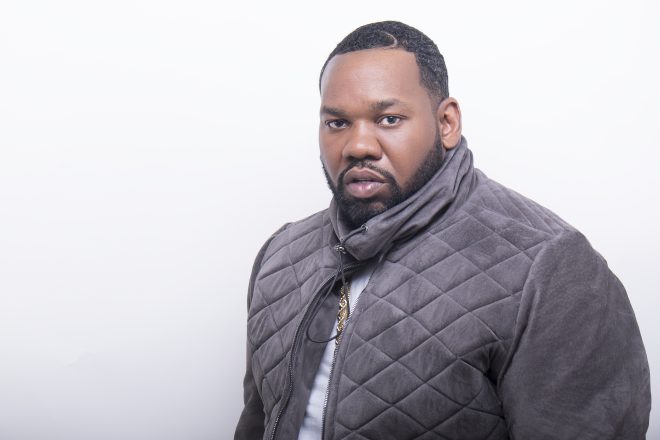
rubyhornet: It’s crazy how there were so many of you, nine emcees/producers in the Wu-Tang Clan. And all are solid, and it's not like you hung up signs on bulletin boards with the “looking for rappers” and taking names type thing. You all kind of were drawn to each other.
Raekwon: It’s called growing up with n***as in the neighborhood. It’s like when you grow up with dudes in the neighborhood, they become your brothers. And you would start to see who’s really down for you. I came from Brooklyn before I came to Staten Island. And me and U-God’s moms, our moms went to school together in Brooklyn. So don’t ask me how they made it out there, they knew each other and I guess it was just our parents wanted to migrate somewhere that was a little safer. And yea, you know, everyone just went to school, snapping on the back of the bus, listening to music and really just growing up as kids.
rubyhornet: I want to talk about the Wu-Tang a bit. You told Sway that you are very protective of the W. You said 'This shit is serious to me. This thing saved me.' Has your relationship to the W changed over time?
Raekwon: Well you know WTC, Wu Tang Clan, those are the 3 initials in my whole name. You know, I'm not afraid to tell y'all my government name is Cory Todd Woods. And I was like, 'Oh shit.' I started dreaming from that. Like too much going on here for it not to be a reality. I’m always going to protect that flag. That flag is what got me here today. I probably wouldn't never came to Chicago if it wasn’t for that flag. I probably wouldn't be able to take care of my mom today if it wasn't for that flag. I wouldn’t have kids probably and they wouldn’t be able to go to great schools if it wasn't for that flag. So of course I'm going to hold that flag with dignity and integrity every time.
rubyhornet: You have one of the most memorable openings in the history of music with the "C.R.E.A.M. start. 'I grew up on the crime side, the New York Times side, staying alive was no jive.” I heard that everybody knew that when "C.R.E.A.M." was finished it was like the touchdown. We got one.
Raekwon: We still was in the hood. Wu-Tang was starting to be heard worldwide from "Protect Ya Neck". Once that took off, we all was like, 'oh shit.' It was more just getting an opportunity to do something that we felt we was good at. That's the first thing. So we wasn’t thinking about the stardom yet, we wasn’t driven by that yet. We was more driven about reputation. When you think about certain boroughs, you got Brooklyn, Queens, Manhattan, the Bronx. But nobody ever really talked about Staten Island. As kids coming up, if we know that we like to travel and go places, yea I've been to Queens, I’ve been to Brooklyn, I'm saying to myself like, 'yo it's no different from over there where I'm at.' But a lot of places we would go, people wouldn’t talk about Staten Island. So that made us angry. That made us angry back home like 'the fuck? We part of the borough too.' So now we got on some shit like 'Ok, since y'all ain't acting like y'all representing our borough, anybody that come through the borough we’re flipping you now.' It’s like, you gotta get beat up so you can take that back to wherever you at.
So it was more just being frustrated and at the same time music, Hip Hop was just big, like I said, we was those guys that was breaking out, getting off Staten Island to go party other places. So you know, even today when I see a lot of dudes from my neighborhood and I say, 'Damn you don’t go nowhere, you don’t go nowhere, you don’t go nowhere, you don’t go nowhere, you stay right here, you don’t go nowhere…. He the only one that leave, he the only one that go somewhere.' My generation of dudes in the neighborhood, we always was down to leave. We was always like 'Yo come on, we going over here.' So we would see a lot early, and dudes from the neighborhood didn’t see that. So we was really determined to let people know what Staten Island is about. And the music was just going to be the outlet for us.
https://www.youtube.com/watch?v=GG62vuHd0dE
rubyhornet: I’ve talked to a lot of artists, and some get tired of their biggest song. Do you ever get tired of performing "C.R.E.A.M. or anything like that?
Raekwon: I do it for the fans because I know that that's something that they wanna hear that they can relate too. That’s like going to see Michael Jackson and he don’t sing "Rock With You" or "Wanna Be Starting Something". Certain records as artists we have to sing. I can’t go see Stevie Wonder and not hear "My Cherie Amor". So I always felt like I had to do those records, mandatory.
Rubyhornet: You mentioned traveling. And you have been able to travel all over the world. And I think performers have a unique perspective cause they’re able to get more experience with other people different from them. I think a lot of, especially in America, is very segregated there are patches of the country where there’s not any differences at all. You’ve been able to travel through different countries, people with different languages, religions, races. And I think for performers that can lead to a unique perspective of what makes people different and also the same. Have you learned anything about human nature through traveling, performing, and meeting people all over?
Raekwon: It goes back to, like I said earlier, coming up in the neighborhood, it’s a real thin chance that we make it out cause we already know the doors we're facing. Either you gonna die in these streets, or you're gonna become an athlete and that’s gonna be your way out. Far as getting jobs was concerned, it was tough, because of the neighborhood that we was living in. So a lot of times we were already judged before we even get to go do that, to go try and get a job. I remember my mom used to wake me up at 8 o'clock in the morning like, 'you gon’ go get a job.' And I'm like, 'aight, I’m down to do it.' And I try it, and it’s like, it never worked. So I come back and be like 'I tried.' And she be like 'yea you tried, but you gon’ try again.'
rubyhornet: What do you think is grabbing everyone else to the W? I’ve seen photos of people all over the world.
Raekwon: That’s the shit... I think it’s just that when you think about Wu-Tang Clan, you see 9 different guys that y’all all could relate to. And I think that’s what it is. People see a collected crew of guys who they could relate to with personalities. You got RZA who is a calm dude, kind of shy. But you got Ol’ Dirty who is loud as a motherfucker, God bless him. So I just think people just was like 'Yo, I fuck with them because it’s so much personality within them. And they seem like they 100% real and they respect where they came from.'
And we was always taught at a young age that if a man don’t know where he came from, a man will never know where he going. So we always was just going to make sure that we stayed being genuine and definitely appreciative. Cause like I said, we didn't know that it was going to where it went. But we had that confidence, that confidence took us to the next level. We believed that we were some ill emcees and we knew that we came with something different because back then you couldn’t get a record deal with 9 members. So we already knew that, but we was like, 'nah we all coming in together.' And that was just more of the plan. But everything happened so quick. I was 22 years old. I didn’t get a chance to go to school or nothing. So it was just like, 'yo when this shit hit….' The first thing I was thinking was I could go back home and tell my mom I got a job. That was more important to me than anything. Just to go back and tell her, 'look your son ain't no knucklehead,' you know what I mean. 'Your son got something going on.'
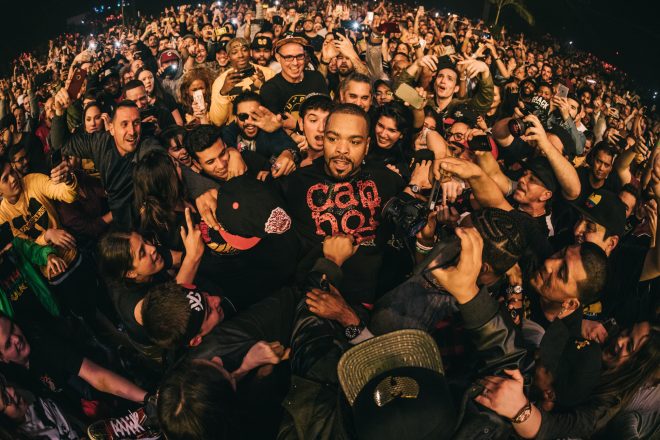
rubyhornet: That’s something I wanted to ask you about because I know that everything you do has a purpose, you’re very purpose driven. And it’s clear, and you talked about the motivation just now of that early music like 'I need to get the fuck outta here. We need to go up, prove ourselves.' What is the battery pack now that you’ve gone out and proven yourselves? What is the force now? When you were going into The Wild the newest album, was it still the push to be a great emcee, or something different?
Raekwon: It’s always to be a great emcee, it’s always to get better. I believe that if you believe in something you want to accomplish, it’s about you knowing that you could do it.
rubyhornet: On the opening skit on Cuban Linx you say “I don’t wanna have 200 thousand dollars, just to have 200 thousand dollars. I wanna know what we're gonna do with it?' If I was 24 and had 200 thousand dollars I might just be like “Damn I got 200 thousand dollars.”
Raekwon: Yea, but you know, we’d been getting money in the street a long time ago. So I felt $200,000 in my hand, and fly out of my hand with my neighborhood. Because my neighborhood was so much drug infested money, when crack came out, I’ve seen it on TV when they first talked about it. I think crack probably came out like a month or two after "Scarface" came out, the movie. So, the drug life was equivalent to a lot of money in my neighborhood. It seemed like all the older people turned into addicts. And it was like, 'oh shit, this drug is really fucking people's minds up.' And you know how it goes, maybe one of my friends will start selling, then the next thing you know them two will start selling, next thing you know they on it, then they on it... And I'm sitting here looking at my sneakers like, 'shit I'm bout to be on it too.' So it was more follow the leader situation. And one thing I can say is that I hung out with a lot of smart dudes. Dudes that really was calculated, they just wasn't knuckleheads. Of course you got some dudes who don’t know how to save money, but then you got dudes that know how to save money. So of course, I had to figure it out. But I started to hang out with dudes that was more smart with theirs.
rubyhornet: Something else you started talking about, you go from making music, Wu-Tang kind of start taking off, things get very fast paced, crazy. You’re also operating in the music industry where you can sell a million actual copies of an album. I remember when Wu-Tang Forever came out with the double disc that was like the height of MTV, the height of record stores, & then one day Napster comes out. And I apologize, I did illegally download some of your songs back in high school. So I do apologize.
Raekwon: Thanks for jacking my shit (*laughs*). Naw it’s all good. But I mean, hey listen, that’s what the music is about, it does this to you. So what? I’m going to be mad at you because you still wanna hear me? That’s what bothers me today with music, because everybody is trying to be so calculated about it, just love the music first. Don’t worry about how many sales he did? Or what’s going on with this? It’s like, 'yo get the music.' I ain’t gon’ front, I wasn’t buying CDs neither. I wasn’t buying nobody's music. I was just living, listening to they music. And that was the vessel for me. Just to be able to hear it and learn from it, and listen to shit that I felt was relatable. So I didn’t care about that. I mean, executives cared about that. We was just more worried about how are we going to be heard and if people gon’ like it or not. And I think that’s one of the first things as an artist that we gotta pay attention to. It’s just that, don’t think about all that, just show us your gift. Let us see if your gift is genuine. And that was important to us.

rubyhornet: That’s interesting because some older artists have said that if they had to come out right now with the way the music industry works, and the streaming, they wouldn’t even want to do it. They liked popping off back when you make album, you sell the CD, everyone makes money. When we first met, there were a lot of artist in your generation that would shun the blogs. And be like 'nah, I'm not fucking with that, nah I'm not fucking with that, who is this 20 year old kid? Fuck this.' But you didn’t want to be like the grumpy old dude and you embraced the blogs and younger generation.
Raekwon: And I was so happy to change my life, man. And I believed in my craft cause I had a lot of friends from my neighborhood, and of course the Wu, that was giving me that battery to be like 'Yo, you talented.' Like my mom didn't even know I was talented like this. Cause a lot of times, I would kind of like stay away from her, cause I was always getting into a lot of trouble. So I never gave her a reason to believe me and know that, 'yo, your son is involved in music.' So I guess it was just having fun. Music is supposed to soothe your mind and just make you have fun. So for us, it was just about that. It was about getting the recognition down the line and make a couple of dollars to get the fuck outta where we was at. I was smart enough to know that when I came into the business, 'yeah I’m going to make some money and I'm going to move my family outta here. We are going to have a better life.' But I know I can’t do that if I’m not 100% locked in with what I believe in: my craft.
rubyhornet: What’s the biggest difference or biggest difficulty operating now in streaming? We don’t get to hear from an artist directly what they think about Spotify, Apple Music. What’s unique about operating now?
Raekwon: It’s a business, it’s more digital now, it’s more technical. And too me, it kind of took away from the culture a little bit. Because I don’t even know if people even want CDs anymore, you know. I remember back in the day that was the most fun shit. To go to your local record store, grab it, open it up, look at the pictures, read it. Now it’s like you just press a button. So it’s like, if that was a math test, we all fucking cheating right now. We ain’t learning from the shit, we just pressing a button. We not really as infatuated the way we were when we had to go get that tape or that CD and stuff.
rubyhornet: Does it change your purpose when you go in and make music or when you're plotting a release? Do you have a different mindset now?
Raekwon: A little bit, only because my business partners, they constantly bring me situations that are to the forefront for me. But when I’m in the zone, and I’m making an album, I don’t think about that at the moment. But I do have to sit down and hear from my team, what their plan is, and they would present it to me and say, 'look this is what’s going on. And this is how we got to adapt to what’s happening today.' So I can dig it. But when I’m in my writing process and creating music, I’m just right there, and I’m like, I just want to make music.
https://www.youtube.com/watch?v=Aav3Jj-GI0g
rubyhornet: One of the things I wanted to talk to you about is Stretch and Bobbito. You mentioned that as one of the things, when you were younger, that got you hooked on stuff from tuning in. You’re in their documentary, "Radio that Changed Lives". And there’s an interesting theme that starts to emerge. Jay-Z, Fat Joe, Nas, Busta Rhymes, I don’t know if you also talked about this, but they started to mentioned how this whole generation of artists were coming up through their radio show. And then people were getting record deals off the radio show. Dante Ross tells the story about hearing you all, then rushing to the studio to sign Ol’ Dirty Bastard. And Fat Joe was like 'A lot of people got deals from the show.' And then Nas was says something like, 'Yeah a lot of people in our generation, we know we owe you.' And Stretch & Bob say how they pretty much had to pay to do the show. And I see them as unsung heroes in a way, and then I start to draw the similarity to blogs that started about a decade ago that are now just going out of business. And the writers are going onto other things. As someone that's had Stretch and Bobbito, and then embraced the blogs like Nah Right, which has just shut down, do you see the parallels?
Raekwon: I call those guys the referees in this sport. All the social media cats from back then, that was making it social media then. These guys had a little radio show. But they shit was at night, late at night. And you know, a lot of times we all are listening to the music late at night. And they show was one of the shows that was consistent. They always played what’s going on, and they had good conversations. And they was willing to open they doors up to dudes. And when they opened up they doors to dudes, it was like a certain kind of pinnacle that we was getting to, and to know that we made it there. And I think that had a lot to do with the momentum of our careers because they was the first guys that we knew that were certified. We were like, 'yo they wasn’t getting no money from no programmers, they just had a little show.' But they had a lot of integrity when it came to the music. And they knew they shit, and that when you got everybody in the city knowing that, 'yo I gotta listen to these dudes because they know what they talking about.' And even before we knew Stretch was a white guy it was like, 'oh he’s white?! that’s cool tho, that’s cool tho, he’s down for the cause tho.' It was like something real quick then it just went away. But we respected the fact that he knew his shit. Bobbito... They knew they shit. They knew everything, they knew the clubs, they knew who was hot, they knew where certain cats was from. And to me, that became our big brother to the system of the music, to the culture rather. So it was like, 'oh, we could go up there and holla at them?! Oh something is about to happen.'
rubyhornet: I saw you guys literally Bum Rushed the studio that night.
Raekwon: Yea, I mean you know, we was just happy to be there. It’s just...yo we’re trying to get on. This is going to be our first place. We gon’ talk a lot of shit, they gon’ talk a lot of shit. And they gonna kind of like dictate what they feel where we at. So it was just more about getting that co-sign from them too.
rubyhornet: I wanna ask one more question. Then I’m going to let some people in the audience ask some questions. But do you remember whe we picked you up from the airport when we did the first session and went to the jamaican spot. Do you remember the first thing you asked me when you got in the car that day?
Raekwon: No.
rubyhornet: You asked “Is MC Hammer a legend?” And then you went and talked about how you felt Wu-Tang Clan was legendary status. But you yourself could not claim legendary status yet. And I’m wondering in the time since you feel like….
Raekwon: I’m a legend?
rubyhornet: Yeah.
Raekwon: Aight, put it like this, I'm a baby legend. I ain’t a grown legend. But my group is legendary. The group is legendary, let’s call it how we call it.
rubyhornet: Styles P said “Hip Hop is a young man's game.You either young and you do your thing. And then you either fall off or become a legend.” And that’s something that you told me too, “You fall off when you decide to stop. And until you decide to stop, there’s no fall off.” So I think, you’re humble about it, but I think you can hit that claim for sure.
Raekwon: That’ll work, I'll take it!!!
Musa Reems Presents A Deep Dive Into Motivation with "44 4's"
"Before I knew it, I was moving up, I would forego classes just to get a couple bucks."
Musa Reems is dedicated. That's apparent as soon as you meet the emcee and college student who is quickly earning his stripes in Chicago's Hip Hop scene. Musa is purposeful in much of what he does, and not afraid of hard work. I know, because since September, Musa has been working with AEMMP Hip Hop, the Columbia College run rap label that has a long history of working with Chicago's top talent (Thelonious Martin, Saba, theWHOevers, C-Sick...).
For those that don't know Musa, his latest joint "44 4's" is a crash course he what he does, and who he does it for. The production is handled by Curbside Jones, a familiar collaborator for Musa and they make a good pairing again on this new joint. Listen up.
[RH Interview] Trackstar The DJ: Rap Fan Eternal
It's something many aspire to, but few actually touch. Young athletes throwing imaginary passes to Jerry Rice in their backyard, striking out Albert Pujols, or hitting that game winning shot over Michael Jordan in an empty gym. It's why Vic Mensa signing to Jay Z is extra special, why Chance working so closely with Kanye West is more than just a regular collaboration. Meeting your heroes is rare enough, being able to work with them everyday and travel the globe is like finding a golden ticket to Willy Wonka's Chocolate Factory.
Trackstar must have opened up a shit load of candy bars because for him, it is life. Trackstar was born in Madison, Wisconsin and moved to St. Louis to attend Washington University. He worked at the school's radio station (KWUR), started DJing, and stuck around for a decade pushing the hip hop scene through $1 mixtapes and parties.
As the story goes - in condensed form - Trackstar was a huge Killer Mike fan, made a mixtape of his favorite Killer Mike tracks, gave said mixtape to Killer Mike in person during A3C in Atlanta, and then was immediately rewarded by being offered the opportunity to DJ for Mike at a showcase opening for Rakim. He did that gig, more gigs, and became Mike's permanent DJ. When Run The Jewels was formed, he took that DJ gig too and hasn't let up since.
The specialness isn't lost on Trackstar. In fact, he gives a wink to his fan-turned-contemporary status on the daily with his growing clothing-brand, Rap Fan.
Fresh off a non-stop year of touring with RTJ, Trackstar talked to me about joining the band, his first pair of turntables, and what he's learned from Killer Mike and El-P.
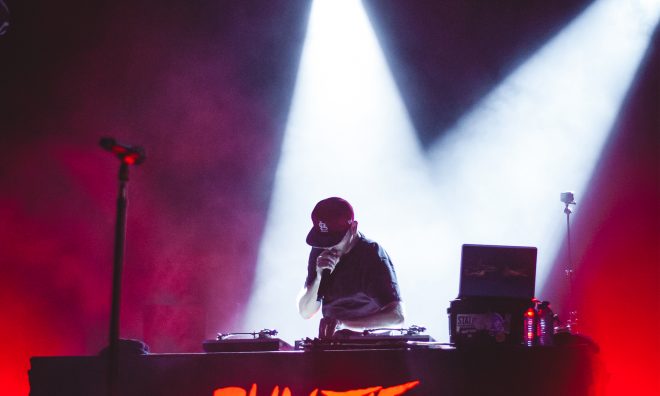
rubyhornet: Do you remember the thing that made you go, “I want to be a DJ” and cop that first pair of turntables?
Trackstar: I bought my first turntable before I really started DJing, because I was an obsessive fan who got into buying records before I starting spinning. When I first walked into my college radio station, KWUR, and saw the wall of hip hop records I needed to have access to them immediately, so I got a radio show. I only started DJing so I could listen to those thousands of records, lol. After that I got a mixer and second turntable.
rubyhornet: In your opinion, what does it mean to be a DJ? Has your insight changed as you’ve grown?
Trackstar: For me, it’s always been about the love of the music over everything else, having a responsibility to filter through all the music out there, and select what’s the right thing to play at a certain time. I’ve definitely learned a ton, and my perspective has broadened in a lot of ways. But at the end of the day, I just hope that the DJ is always one of the biggest music fans in the room, and that passion is what informs why they do what they do.
rubyhornet: You have been DJing for Run The Jewels since the beginning of the group. I kind of want to know if you were “part of the band” from the start, or if there was a moment when you went from being the RTJ DJ to the 3rd member of the band?
Trackstar: By the time RTJ1 came out, I’d been Mike’s DJ for a couple years, and we had already been on the road with El once on the Into the Wild Tour with Despot and eXquire, so we were all already tight. It was a pretty easy transition into the RTJ unit, and I’ve always felt like part of the band. It’s a funny dynamic because I am the unofficial third member, and I’ve done every RTJ show that’s ever happened (and hopefully ever will), but technically RTJ is Jaime and Mike. Which is pretty much how it should be—no matter what I may mean to the group and the live show, at the end of the day Run the Jewels is the manifestation of the amazing friendship between those two amazing dudes.
rubyhornet: The group rose to become one of the most important groups in music over the last few years, equally for the music as well as the messages outside the music. Killer Mike especially was a sought after voice during the election season. What insight have you gained about the social responsibility of artists through your friendship and working relationship with RTJ? Why do you think Mike and El-P hold that deeply, whereas not all artists really pick up that torch?
Trackstar: The thing about those guys and their social messaging is that it’s genuine, and that’s clear from how they express it. They aren’t new to thinking about the way the world works and expressing their viewpoints—they’ve both been doing it their whole lives, each in their own ways, which is true to who they are, and that comes across when they speak on the issues. At the same time, they don’t paint themselves into a corner where that’s their only angle, or where they HAVE to speak or take a position on anything. If you really look at the lyrics, for the most part they really aren’t political—the social commentary gets more press, but RTJ is at least 57% dick jokes.
rubyhornet: You worked with Killer Mike for years prior to Run The Jewels and I know he was one of your favorite rappers. You made a mixtape of all Killer Mike cuts, which kind of sparked your relationship. What was it initially about his music that struck you so much?
Trackstar: I used to make T-shirts that said “Hip Hop Needs Balance”, and that really describes what I look for in an MC. In Mike I found someone who was smart and had shit to say but didn’t fit into the “conscious” box, and was aggressive and had street cred but didn’t paint himself into a corner as a gangster rapper. I’d heard Monster when it dropped, but didn’t give it the attention it deserved. But from the first time I heard “That’s Life”, it was clear he was instantly one of my favorite MCs.
rubyhornet: Coming up as a DJ, was it in your plans to be a DJ for a Hip Hop group? Was this always something you wanted to do?
Trackstar: Really from the start for me, it was about wanting to help dope music get heard, from bothering my friends to listen to whatever new artist I was hearing, to having an underground hip hop radio show, to making mixtapes showcasing dozens of local artists who I thought deserved bigger audiences. So in a way it makes sense that I’d end up being part of the support system for two of my favorite artists, but honestly I didn’t have any grand ambitions of being a part of anything on this level. I never really thought past being a part of the local scene in St Louis and helping my crew get the love it deserved.
rubyhornet: Aside from being in Run The Jewels, you have your line Rap Fan. What’s it like to essentially run a business from a tour bus?
Trackstar: It can get stressful keeping track of stock and all that but it’s great—RTJ’s merch guy Jordan helps me out a lot and it’s just really dope that people like the stuff I put out there enough to buy it.
rubyhornet: I see the line continue to grow and pop-up in new places, new products, and new fans. From your perspective, why do you think so many people are connecting with it? It seems like there is a "beauty in simplicity" type of thing happening.
Trackstar: Yeah it’s really a simplicity thing I think, which is what I was going for—I wanted to make some merch but didn’t want to make it all about myself, and wanted it to be something that was timeless and would be something I’d still relate to (and not be ashamed of) in five, ten years…nothing had been more consistently central to my life than my status as a fan of hip hop, so Rap Fan just made sense. Fortunately a lot of people seem to relate, which has been really gratifying to see.
rubyhornet: You do a lot of the cuts and scratches on RTJ records, who are some of the turn-tablists you look up to and have studied?
Trackstar: Honestly I’ve never been focused on turntablism. Scratching was never my main thing, but I’m doing my best to do a respectable job, especially since so many of the kids seeing our shows have hardly ever seen a rap group with an actual DJ who scratches! Shadow, Z-Trip and Q-Bert all have joined us onstage, which is insane because they’ve all been influences since before I even started DJing…those guys, Cut Chemist, the Beat Junkies and a thousand people I’m leaving out were huge for me. But really my biggest influences were all St. Louis DJ's that I watched and studied every week— Charlie Chan, Mike 2600, Needles, Da Fly D-Ex, K9, Crucial…I know I’m leaving folks out that I love dearly, but I gotta stop somewhere. There’s so much DJ talent in St Louis that folks don’t know about.
rubyhornet: What’s always been interesting to me about RTJ is that both Mike and El-P had decade plus careers before the group, and in some ways, were written off as underground rappers. So to see the success now has got to be gratifying on many levels. The life of a DJ is also a battle of persistence. Where were you in your career before this, had you ever thought of changing things up and doing something else?
Trackstar: When I started working with Mike, I had never considered giving up on my DJ career, but was definitely getting close to having to do some serious examination of my five-year plan. I’ve always been all over the place with a lot of endeavors going on—mixtapes, clubs, working with artists, radio, education, writing—so as working with Mike started taking more time I just scaled back a bit on all the other stuff—everything progressed really naturally and gradually. One of the best parts about the way this success has come is the timing—we’re all experienced enough to not mishandle the amazing opportunities in front of us. We’ve already made and seen so many of the mistakes and can avoid those pitfalls since we’re a little older and wiser.
rubyhornet: Lastly, I just saw that you have a video mega-mix getting ready to drop. When is that coming, any info you want to share about the making of this project. I can’t really think of another project like this one in which the touring DJ records every show and then makes a live-video mixtape.
Trackstar: Man I’m so excited about this thing. So I’ve recorded every show for the last couple of years from multiple angles with my trusty GoPros—it’s a lot of work but like I said, I’m always doing too much. Around when RTJ3 came out, I made a megamix of RTJ tracks from all three albums, playing acapellas over instrumentals from other songs, doing little DJ tricks and such. We were trying to figure how to present the megamix when I had the idea to make a DJ-tour-movie-mega-visual-mixtape…one of my best friends (who also did my Trackstar logo) is an incredible director, so I worked with his company Filmograph to put this thing together, and it is awesome. We have such a good time onstage and it comes through in the footage. We just dropped the second segment, and I can’t wait to get the whole thing out there to the people.
Hear An Uncovered Malcolm London + Kweku Collins Track on the LTAB 2018 Mixtape
"Always bout my bills, no Bill Cosby."
The only things certain are death and taxes. Just below that are other things we can begin to count on every year, the LTAB mixtape has become one of those things. For the last few years, Young Chicago Authors, has put together a free mixtape to coincide with their annual youth poetry slam, Louder Than A Bomb. This year's mixtape includes an almost overwhelming 26 tracks from familiar as well as unfamiliar names ranging from Femdot and Matt Muse to Aeon Moore and Loona Dae. Also included is an uncovered collaboration from Malcolm London and Kweku Collins.
I do remember Malcolm and Kweku recording this in the Closed Sessions C-Room, I believe it was very close to the time Kweku started coming around. I don't really remember much outside of that, and honestly totally forgot about this song. This is actually the first time I've heard it, and I fucking dig it.
Outside of the song's quality, it's just dope to see this record come to life via the LTAB mixtape. Good mixtapes include rarities and b-sides, and YCA is keeping that spirit alive. Peep the full mixtape below, you might just find a new favorite.
[Review] Jay Z's 4:44 album is refreshing and makes your mind wander and reflect
I owe Jay Z an apology. Since Watch The Throne, I've said "Jay doesn't need to rap anymore." "He's too rich, now." "Jay Z' is above this world of hip-hop to connect with his core audience." The 4:44 album is proof that I was dead wrong. It also proves Jay Z can do anything and he should never be questioned or doubted ever in the world of hip-hop. 4:44 is Jay Z's "Back To The Future II album". It's like the album is recorded in an alternate time warp between 1999-2001. Much like Marty when he had to go to the "other 1985" to make things right for the future of his existence in others. Big Homey Jay has returned and the game is being redirected.
Tracks like "Kill Jay Z", "4:44" and "Smile", give the most revealing Jay ever. He really gives us real clips on his personal life. His struggles of being a married man, a father and a softer individual with feelings that deals with emotions. Something we rarely got over the last 2 decades. He touches on every possible instance that ever made the media and the watching and talking streets. Kanye, Solange, Beyonce, Un and much more. It's refreshing and makes your mind wander and reflect on the life you've had a privilege to watch all this time.
Then you have joints like "Family Feud", "Bam" and "The Story of O.J". These joints put in perspective who really getting this money and moving right out here. Nobody can ever out rap Jay Z when it's time for show and tell. From the tone to the bar itself. If Jay Z says he's got it. You believe it. Blue and the twins have an 8 million dollar painting to cash in right now. Everybody holding money to their ear still making collect calls to Hov and he's not taking collect calls.
"Moonlight" "Caught Their Eye" attacks the industry and everything messed up in it. From the flows to the record deals, Prince and more. It's just that standard "Big Homey Talk" that Hov has been giving out for years.
Is 4:44 the best Jay Z album? You can honestly argue it. This album is 180 growth from Reasonable Doubt. This is The Dynasty content with more detail. This is everything we thought Magna Carta Holy Grail would be. Not to mention Jay Z is still rapping at a high level. "Shinning" and other moments over the last 4 years are easily forgettable after the first 4 tracks on this album. It will honestly be many Jay fans and rightfully so. Chances are if you're a day 1 Jay z fan in real time. [Meaning you bought Reasonable Doubt by at least 1998] You're between 32-38 or older. Which means you and Jay will have an adult conversation about the life he's lived. A life like none other. Take a seat and chill with ya mans and catch up with him. What you doing at 4:44 anyway?
The Story of O.J.
[Video] Kanye West Appears on 'Late Night with Seth Myers'
Kanye West, with his Yeezus tour finally over and some time on his hands, decided to stop by Seth Myers' new show and help him continue to break into the late night circuit by stopping by to chat about the extravagant tour, get some baby news out of the way and clear the stage for the real show, which came after the brief back and forth between the husband of Kim Kardashian and the former 'Saturday Night Live' cast member who took over for Jimmy Fallon in the late night spot after the Jay Leno domino finally fell, opening the lines of succession. Kanye performed what became a career-spanning set that touched on his hits from the entirety of his catalogue, begininning with "Jesus Walks", "Touch The Sky" and "Stronger" before making his way through the dark 808s & Heartbreaks days, even live auto-tuning "Heartless" and continuing on to My Beautiful Dark Twisted Fantasy and beyond, wrapping things up with a rousing rendition of "Black Skinhead" to wrap things up. Check out the full video, streaming below.
[iframe id="http://www.dailymotion.com/embed/video/k1Q3mLq8eInfrN5CwNb?logo=0&info=0&quality=720&highlight=FF0000" height="440" width="100%" allowfullscreen="" frameborder="0"]
[iframe id="http://www.dailymotion.com/embed/video/k7e6V9rAF5ayDC5Cx5o?logo=0&info=0&quality=720&highlight=FF0000" height="440" width="100%" frameborder="0"]
50 Cent Leaves Shady/Interscope, Releases "Funeral"
It doesn't seem like a big thing, a major artist leaving his record deal after more than a decade relationship. People grow, things change and circumstances often dictate changing where one does business. This is not the case for 50 Cent and his departure from Jimmy Iovine's behemoth Interscope Records. To be sure, 50 Cent is a dinosaur of sorts navigating a new, somewhat unfamiliar landscape. His 2003 album Get Rich or Die Tryin' broke sales records and firmly placed him amongst rap's elite. I may be wrong on this, but, at least for my adolescent self, Get Rich or Die Tryin' seemed to be the last major, MTV-fueled hip-hop album to really make a mark. Obviously, The College Dropout followed a year later, eventually pitting 'Ye and 50 against each other in a sales battle upon the releases of Graduation and Curtis in 2007, which 50 was beaten.
50 exiting the major label industry is a big deal. It leaves Eminem honestly as one of the last holdovers for the major label format that existed a decade ago, and that only because of his individual label, Shady, which 50 Cent was a part of. Back in 1999, with the advent of Napster, we saw the inklings of what the music industry would become, a business that is just now manifesting itself with Grammy award-winning acts not signed to a major and acts putting out free projects that reach the charts. 50's decision to release his next project, Animal Ambition through Caroline, a distributorship owned by Universal. Similar to the deal Macklemore & Ryan Lewis employed with The Heist, albeit with a lot more of a budget thanks to smart business moves by Fiddy over the years. “I have had great success to date with Shady/Aftermath/Interscope, and I’d like to thank Eminem and Dr. Dre for giving me an incredible opportunity,” 50 Cent said in a statement. “I’ve learned so much from them through the years. I am excited to enter this new era where I can carry out my creative vision.”
50 Cent's independent debut will begin on June 3 with Animal Ambition, an unexpected turn for fans who expected the long-teased project Street King Immortal. “I recorded so many album-quality songs that I’m going to put the Animal project out as my viral marketing plan and then [Street King] will come out after,” he explained at a recent press conference. “[Animal Ambition] is about prosperity ... ambition and prosperity.”
Check out the video for 50's new song "The Funeral," released today, below.
[youtube id="l-9pGIDsyvs"]
[Mixtape] Justin Rose: "RoseWaVve Vol. 1"
Late last year we profiled New York City product Justin Rose as part of our First Look series. At the time, the 23-year-old producer was hard at work on his debut, while also finishing work on frequent collaborator Kris Kasanova's project. Today, we finally get the product of that hard work as Rose's follow up to last year's release, 22kt: The Instrumental Tape, RoseWaVve Vol. 1 hit the net today with a premier on his own website, Rsgldthewrld.com. The latest features Rose both producing on the back end of the tracks and gracing the songs with his own flow. Tearing down the wall between producer and rapper can be a tightrope job, but Rose does it admirably here. On "Fear and Loathing" Rose transitions between rhyming in a variety of cadences while also helping on the hook. Here he sounds like what I believe Chief Keef might have been had the lean and bad decisions not gotten to him, with a wavy feel to it. Kasanova links up with him on "On It (How 2 Make It In America)" for what is a kick back in itself. The production alone is something to take note of as well. "Moving Tho" is an airy alternative r&b beat that floats off with a dreamy guitar line. The waves are certainly present here and Rose's latest is not to be missed. "Party4Me" is a potential club banger with huge drums paired with a clever hook and interesting inverted guitar riffs, showing the project can straddle several situations.
As artists across the country are coming up with more talents at their disposal, Rose's latest project proves he can hang with the best of them in this stepping out from the boards. Hit the link below to get the free download for the project and keep an eye out for much more to come from Justin Rose.

